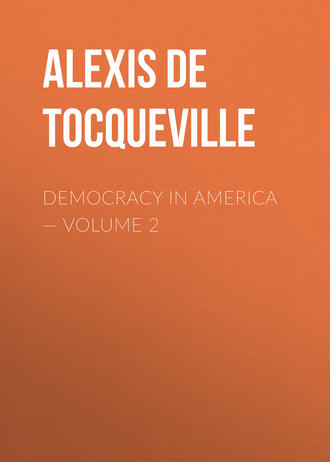 полная версия
полная версияDemocracy in America — Volume 2
21
See Appendix V.
22
It is scarcely necessary for me to observe that the dread of war displayed by the nations of Europe is not solely attributable to the progress made by the principle of equality amongst them; independently of this permanent cause several other accidental causes of great weight might be pointed out, and I may mention before all the rest the extreme lassitude which the wars of the Revolution and the Empire have left behind them.
23
This is not only because these nations have the same social condition, but it arises from the very nature of that social condition which leads men to imitate and identify themselves with each other. When the members of a community are divided into castes and classes, they not only differ from one another, but they have no taste and no desire to be alike; on the contrary, everyone endeavors, more and more, to keep his own opinions undisturbed, to retain his own peculiar habits, and to remain himself. The characteristics of individuals are very strongly marked. When the state of society amongst a people is democratic—that is to say, when there are no longer any castes or classes in the community, and all its members are nearly equal in education and in property—the human mind follows the opposite direction. Men are much alike, and they are annoyed, as it were, by any deviation from that likeness: far from seeking to preserve their own distinguishing singularities, they endeavor to shake them off, in order to identify themselves with the general mass of the people, which is the sole representative of right and of might to their eyes. The characteristics of individuals are nearly obliterated. In the ages of aristocracy even those who are naturally alike strive to create imaginary differences between themselves: in the ages of democracy even those who are not alike seek only to become so, and to copy each other—so strongly is the mind of every man always carried away by the general impulse of mankind. Something of the same kind may be observed between nations: two nations having the same aristocratic social condition, might remain thoroughly distinct and extremely different, because the spirit of aristocracy is to retain strong individual characteristics; but if two neighboring nations have the same democratic social condition, they cannot fail to adopt similar opinions and manners, because the spirit of democracy tends to assimilate men to each other.
24
It should be borne in mind that I speak here of sovereign and independent democratic nations, not of confederate democracies; in confederacies, as the preponderating power always resides, in spite of all political fictions, in the state governments, and not in the federal government, civil wars are in fact nothing but foreign wars in disguise.
25
See Appendix W.
26
In democratic communities nothing but the central power has any stability in its position or any permanence in its undertakings. All the members of society are in ceaseless stir and transformation. Now it is in the nature of all governments to seek constantly to enlarge their sphere of action; hence it is almost impossible that such a government should not ultimately succeed, because it acts with a fixed principle and a constant will, upon men, whose position, whose notions, and whose desires are in continual vacillation. It frequently happens that the members of the community promote the influence of the central power without intending it. Democratic ages are periods of experiment, innovation, and adventure. At such times there are always a multitude of men engaged in difficult or novel undertakings, which they follow alone, without caring for their fellowmen. Such persons may be ready to admit, as a general principle, that the public authority ought not to interfere in private concerns; but, by an exception to that rule, each of them craves for its assistance in the particular concern on which he is engaged, and seeks to draw upon the influence of the government for his own benefit, though he would restrict it on all other occasions. If a large number of men apply this particular exception to a great variety of different purposes, the sphere of the central power extends insensibly in all directions, although each of them wishes it to be circumscribed. Thus a democratic government increases its power simply by the fact of its permanence. Time is on its side; every incident befriends it; the passions of individuals unconsciously promote it; and it may be asserted, that the older a democratic community is, the more centralized will its government become.
27
See Appendix X.
28
This gradual weakening of individuals in relation to society at large may be traced in a thousand ways. I shall select from amongst these examples one derived from the law of wills. In aristocracies it is common to profess the greatest reverence for the last testamentary dispositions of a man; this feeling sometimes even became superstitious amongst the older nations of Europe: the power of the State, far from interfering with the caprices of a dying man, gave full force to the very least of them, and insured to him a perpetual power. When all living men are enfeebled, the will of the dead is less respected: it is circumscribed within a narrow range, beyond which it is annulled or checked by the supreme power of the laws. In the Middle Ages, testamentary power had, so to speak, no limits: amongst the French at the present day, a man cannot distribute his fortune amongst his children without the interference of the State; after having domineered over a whole life, the law insists upon regulating the very last act of it.
29
In proportion as the duties of the central power are augmented, the number of public officers by whom that power is represented must increase also. They form a nation in each nation; and as they share the stability of the government, they more and more fill up the place of an aristocracy.
In almost every part of Europe the government rules in two ways; it rules one portion of the community by the fear which they entertain of its agents, and the other by the hope they have of becoming its agents.
30
On the one hand the taste for worldly welfare is perpetually increasing, and on the other the government gets more and more complete possession of the sources of that welfare. Thus men are following two separate roads to servitude: the taste for their own welfare withholds them from taking a part in the government, and their love of that welfare places them in closer dependence upon those who govern.
31
A strange sophism has been made on this head in France. When a suit arises between the government and a private person, it is not to be tried before an ordinary judge—in order, they say, not to mix the administrative and the judicial powers; as if it were not to mix those powers, and to mix them in the most dangerous and oppressive manner, to invest the government with the office of judging and administering at the same time.
32
I shall quote a few facts in corroboration of this remark. Mines are the natural sources of manufacturing wealth: as manufactures have grown up in Europe, as the produce of mines has become of more general importance, and good mining more difficult from the subdivision of property which is a consequence of the equality of conditions, most governments have asserted a right of owning the soil in which the mines lie, and of inspecting the works; which has never been the case with any other kind of property. Thus mines, which were private property, liable to the same obligations and sheltered by the same guarantees as all other landed property, have fallen under the control of the State. The State either works them or farms them; the owners of them are mere tenants, deriving their rights from the State; and, moreover, the State almost everywhere claims the power of directing their operations: it lays down rules, enforces the adoption of particular methods, subjects the mining adventurers to constant superintendence, and, if refractory, they are ousted by a government court of justice, and the government transfers their contract to other hands; so that the government not only possesses the mines, but has all the adventurers in its power. Nevertheless, as manufactures increase, the working of old mines increases also; new ones are opened, the mining population extends and grows up; day by day governments augment their subterranean dominions, and people them with their agents.
33
See Appendix Y.
34
See Appendix Z.
35
The 20th degree of longitude, according to the meridian of Washington, agrees very nearly with the 97th degree on the meridian of Greenwich.
36
A folio edition of this work was published in London in 1702.
37
This passage is extracted and translated from M. Conseil's work upon the life of Jefferson, entitled "Melanges Politiques et Philosophiques de Jefferson."
38
See "Memoires pour servir a l'Histoire du Droit Public de la France en matiere d'impots," p. 654, printed at Brussels in 1779.
39
This clause is superseded by Article XII, Amendments. See page 396.





